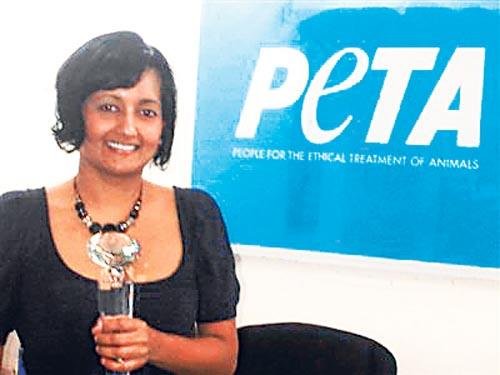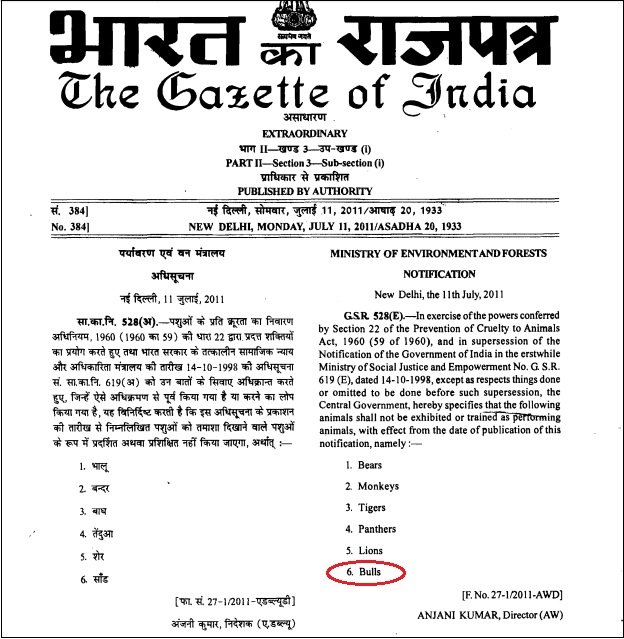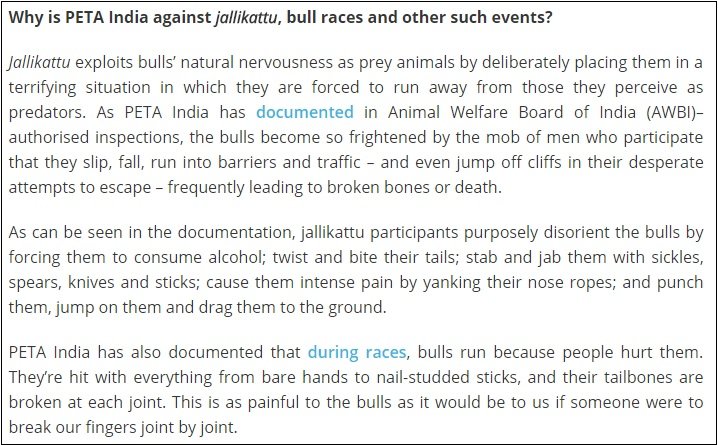If you ask typical Jallikattu supporters, ‘who got their centuries-old bull-taming sport banned’, the answer will invariably be PETA (People for the Ethical Treatment of Animals).
They’ll tell you that it was this international NGO that moved court against the sport, effectively responsible for the ‘unfair’ law India now has against holding of the sport.
Ban Peta is the demand in Marina-Actually all foreign funded NGOs ae inimical to Indian interests-enlarge the demand:) RT
— RVAIDYA (@rvaidya2000) January 20, 2017
However, it’s a theory that PETA India CEO Poorva Joshipura laughs at, wondering at the ignorance of those batting for the “tradition”.

She explained to Scoopwhoop News, “The original petition against the sport came from a Tamilian from Madurai, A Nagarajan. His son was killed during a Jallikattu event.”
This report confirms it, saying that the son, N Marimuthu, was sitting amidst the spectators at a 2004 event in Alanganallur when it was gored by a bull. The petition prompted the Madras High Court to ban Jallikattu in March 2006, kick-starting a legal battle that rages on.
Poorva points out yet another irony: that PETA joined the case much later and by no means is it the only one to do so. The Animal Welfare Board of India, for instance, is among the many organisations and individuals that backs the ban.
“The focus on PETA shows complete ignorance,” she said.
PETA is a soft target
She added that PETA is being singled out because it’s a soft target. “The internet is full of memes on PETA. Bizarre conspiracy theories are being conjured up. I being the CEO am personally being targetted,” she said.
Jallikattu is fight to preserve our indigenous culture and traditions against foreign funded activism.. pic.twitter.com/EXi2wsry7Z
— Amit Malviya (@malviyamit) January 20, 2017
Among the many allegations against her, is that she is not even an Indian citizen – a charge she thinks is both false and frivolous.
“I am very much an Indian despite my American accent. My ancestors were Indians, my husband is Indian. I went to the US to study and have been living in India for years now!”
Poorva slams the very basis of this charge. “It should not matter if I was from Mars or Venus as anyone with a heart can recognise cruelty to animals.”
About the vicious personal attacks on her, Poorva said she is being subjected to vile allegations on social media such as being a foreign stooge and hypocrite, and threats ranging from rape to ‘your days are numbered’. She said she is routinely called a whore on social media.
“There is this false claim that I wear leather which is going viral,” she said.
Poorva Joshipura, CEO of @PetaIndia can wear leather shoes BUT #jalikattu is inhuman?
SHUT down @PetaIndia @peta. they are crooksviaWA pic.twitter.com/HGG3vQkCbo— #GauravPradhan 🇮🇳 (@DrGPradhan) January 14, 2017
Thankfully, the threats haven’t spilled over in real life but the organisation has notified the police just in case.
“All this is bullying. The supporters have gone after the whistle-blowers as well as celebrities like Trisha Krishnan who don’t even have anything to do with the ban.”
“How then do you consider their support for Jallikattu as legitimate?” she hits back.
We do not go after only Hindu traditions
Poorva also trashed the argument that PETA goes only after Hindu traditions while being soft on gory festivals of other communities.
“We don’t choose animal issues based on religion. Anybody who says this has clearly not visited our website. We campaign against illegal slaughter houses everyday. We ask people to not eat animals, to not wear animals all the time.”
Poorva knows that the most scathing and common argument of Jallikattu supporters is that it’s silent on Bakri-Eid where goats are slaughtered while being aggressive on Jallikattu where bulls are hounded and wounded but not killed.
PETA on #Jallikattu and PETA on Bakri Eid pic.twitter.com/v3XVGNCEs2
— The-Lying-Lama (@KyaUkhaadLega) January 20, 2017
It’s important to note here that the laws make an exception for religious festivals like Bakri-Eid and allow slaughter outside slaughter houses under given conditions.
“PETA is not a law-making body. All we can do is to work to make sure that animal rights under the law are upheld,” she said, adding, “We are waiting for a day when there is a complete stop on all kinds of animal slaughter,” she adds.
On other days, Indian laws ban slaughtering of animals on streets, basically outside a licenced slaughterhouse. “We encourage people to contact us for any animal emergencies. If that happens, we guide them,” she said.
Poorva adds that this comparison with Bakri-Eid cannot be the best argument by the pro-Jallikattu crowd.
And what does the law say
To back the Jallikattu ban, Poorva again cites Indian laws. She said that bulls are barred under law from taking part in a sport like Jallikattu.
Here, readers must learn that this law came into force only in 2011 – five years after the original petition – when the then UPA government modified a 1991 law to add bulls to the list of animals banned from training and exhibition which earlier only had bears, monkeys, tigers, panthers and dogs.

Here, critics say that PETA influenced this modification. Poorva says that the organisation, in principle, is against Jallikattu for being ‘inherently cruel to bulls”.
Poorva directs us to a statement on their website under a question ‘Why is PETA India against jallikattu, bull races and other such events?’
The answer reads:

She concludes: “Look, while we are being targetted for being anti-India, all I know is that supporting cruelty to animals is the most un-Indian thing to do.”

















